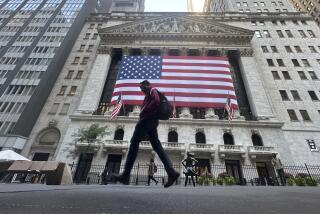FINANCIAL MARKETS : STOCKS : Dow Rises 1.98; Market Ends 1st Half Up 127.49
The stock market inched ahead Friday, capping off the first half of 1990 on a positive note.
The Dow Jones index of 30 industrials rose 1.98 to 2,880.69, bringing its gain for the week to 23.51 points.
Over the first six months of the year, the index climbed 127.49 points.
In the broader market, advancing issues outnumbered declines by about 5 to 3 in nationwide trading of New York Stock Exchange-listed stocks, with 954 up, 583 down and 469 unchanged.
Big Board volume came to 145.55 million shares, against 136.12 million Thursday.
Analysts said many investors remained wary about prospects for second-quarter profit reports due from corporate America over the next several weeks.
The figures are expected to show the continuing adverse effects of a sluggish economy. Several large industrial companies have already served notice that their earnings for the April-June period haven’t lived up to expectations.
However, investors apparently have decided not to dump stocks in response to that prospect.
Instead, they have been seeking out and bidding up stocks of companies in recession-resistant businesses, such as food and pharmaceuticals.
Gainers among the blue chips included Procter & Gamble, up 1 3/8 at 87 1/8; Philip Morris, up 1/8 at 46 1/2; American Express, up 1/4 at 30 3/4; Merck, up 5/8 at 86 3/4, and Eastman Kodak, up 1/8 at 40 1/2.
American Telephone & Telegraph slipped 1/4 to 38 1/2 in active trading. The stock has been under pressure since midweek, when the company said it expected to post lower second-quarter earnings.
Hasbro, among the American Stock Exchange volume leaders, fell 7/8 to 18 3/8 following a company estimate of a drop of more than 50% in second-quarter profit.
Precious-metals stocks rallied a bit as the price of gold gained $5.80 an ounce to $357.90 on the Commodity Exchange in New York. Newmont Gold rose 1 7/8 to 42 5/8, ASA Ltd. gained 1 to 45 1/2 and Homestake Mining added 5/8 to 18 1/4.
Bairnco dropped 1/2 to 6 1/2. The company said it was expecting to post significant losses for the second quarter, partly as a result of costs arising from the planned spinoff of its Keene Corp. operations.
Prices on the Tokyo Stock Exchange fell marginally as investors sold on expectations of higher interest rates. The blue chip Nikkei stock index of 225-shares, which lost 206.56 points Thursday, fell another 165.95 points to close at 31,940.24.
Stock prices rose in London as the successful completion of the June Financial Times 100 stock index contract was well received by the market. At the close, the broad-based 100-share index was up 18.9 points at 2,374.6.
In Frankfurt, West Germany, shares fell on the last trading day before Sunday’s German monetary union, but dealers were not worried about the market’s future. The 30-share DAX index closed 15.27 points down at 1,879.9.
CREDIT
Talk of Tax Hike Sends Bonds Higher Bond prices finished higher for the fourth straight day after President Bush repeated his comments that a tax hike may be necessary to prod the stalled budget talks in Congress.
The Treasury’s benchmark 30-year bond rose 15/32 point, or $4.69 per $1,000 face amount. The 30-year bond had risen $13.13 in the three previous sessions.
Its yield, which falls when prices rise, slipped to 8.40% from 8.44% late Thursday.
The federal funds rate, the interest rate banks charge each other on overnight loans, was quoted at 7.5%, down from 8.3125%.
CURRENCY
Interest Rate Fears Drag Dollar Down The dollar fell in quiet trading on world currency markets.
Traders said the dollar lost ground amid anticipation of lower U.S. interest rates.
“The dollar is once again in a vulnerable position vis-a-vis the European countries, which have a demand for capital,” said Ron Holzer, chief dealer at Harris Trust & Savings Bank in Chicago.
Because the demand for capital is high overseas, European interest rates have been edging up and in turn, attracting investors to European securities.
President Bush’s announcement that taxes must be raised to help offset the nation’s budget deficit also served to push the dollar lower. To many market players, new taxes and a reduced budget deficit fuel the notion that interest rates will head lower because lessening federal borrowing needs would reduce demand for credit.
COMMODITIES
Gold Makes Biggest Gain in 3 Months The threat of mining strikes in South Africa and the Soviet Union helped muster the depressed gold market to its strongest one-day advance in nearly three months on New York’s Commodity Exchange.
On other commodity markets, silver futures also advanced; soybeans surged while grain futures were mixed; livestock and meat futures were mostly lower, and energy futures slipped.
Gold futures rose $5.80 to $5.90 in New York, with the contract for delivery in August settling at $359.90 an ounce. The thinly traded July contract ended at $357.90.
It was gold’s most muscular rally since April 6, when futures prices jumped $5.90 across the board.
Silver futures settled 7.1 to 7.8 cents higher on the Commodity Exchange, with July at $4.887 an ounce.
Analysts said the rally partly reflected trade buying to secure supplies ahead of a threatened general strike next week in South Africa and a threatened Soviet miners strike a week later.
Tables begin on D6
More to Read
Inside the business of entertainment
The Wide Shot brings you news, analysis and insights on everything from streaming wars to production — and what it all means for the future.
You may occasionally receive promotional content from the Los Angeles Times.










